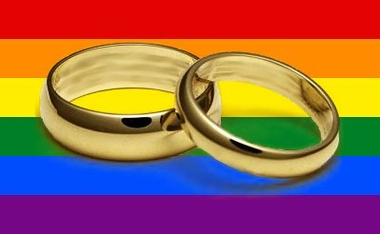RI gay marriage bill may hinge on religious clause

DAVID KLEPPER, Associated Press
PROVIDENCE, R.I. (AP) — Maria Valente and Andrea Bond were married in Massachusetts four years ago by a justice of the peace. The East Providence women insist they're just like any other couple raising three children. But a few years ago, when Bond had surgery in Rhode Island, they found out not everyone agrees.
"I was told I couldn't be in the room with her," Valente said. "It was discouraging and hurtful. The children were upset. Why drive a wedge into a family like that?"
Valente and Bond hope Rhode Island joins the rest of New England this year in allowing gay and lesbian couples to marry. But they're concerned that the kind of treatment they received may still be allowed if lawmakers insert a broad religious exemption allowing religious organizations like churches, hospitals and schools — or private businesses — to ignore the law and decide for themselves whether they want to extend benefits and rights to married gay couples.
Supporters and opponents alike predict the debate could turn on the religious exemption. The bill passed the House in January but has yet to receive a vote in the Senate. Senate President Teresa Paiva Weed, who has opposed gay marriage in the past, has said the sticking point in the debate for many senators is how broad the exemption is. Several senators, she said, wanted a more expansive exemption to protect religious organizations and private individuals who do not want to recognize gay marriage.
The same objection has been raised by the Roman Catholic Church and several religious leaders who say the issue comes down to religious liberty. They argue that religious schools and charitable organizations like the Knights of Columbus shouldn't be forced to change employee benefit policies, or rent an event hall to a same-sex couple looking to hold a wedding reception.
"The establishment of same-sex marriage would pose yet another threat to religious freedom," wrote Bishop Thomas Tobin, the leader of the Providence Diocese, in a column in the state's Catholic newspaper. "... Religious bodies will be obliged to extend their resources, facilities and benefits to individuals who are living in immoral relationships — contrary to sincerely held religious beliefs."
Sen. Harold Metts opposes the legislation and said the effect on religious organization is a "big consideration." The Providence Democrat said it would be contrary to the nation's traditions of religious freedom to force anyone to recognize the marriages of same-sex couples.
"A lot of people forget the religious liberties we have in this country," he said. "We certainly want to make sure that it's protected."
The bill passed by the House states that religious institutions may set their own rules for who is eligible to marry within their faith and specifies that no religious leader can be forced to officiate at any marriage ceremony. While ministers already cannot be forced to marry anyone, the exemption helped smooth the bill's passage in the House.
Supporters of gay marriage say that while they can support the current exemption, they don't want it broadened. Two years ago, when it became apparent that gay marriage legislation would fail in the General Assembly, lawmakers passed a civil union law that contained a broad exemption allowing religious organizations to ignore the relationships. Under the law, religious cemeteries could deny adjoining burial plots to a couple in a civil union, and religious hospitals could refuse to let one partner make a medical decision for another. Fewer than 100 couples have sought a civil union.
Any effort to craft a similar exemption for gay marriage in Rhode Island would in effect be a "poison pill" that causes the legislation to fail with supporters, said Rev. Gene Dyszlewski, chairman of the Rhode Island Religious Coalition for Marriage Equality.
"It's very clear to me that religious groups are free to practice their religion without any restraint," he said. "Making the marriage law more complicated doesn't solve the marriage problem. I find it hurtful that there are religious groups who are asking for permission to discriminate."
Rhode Island already has a law banning many types of discrimination based on sexual orientation.
Other states with gay marriage laws have handled the religious question in different ways. In Washington state, for example, the law says that no religious leader is required to perform a gay marriage, and that no religious organization is required to provide "accommodations, facilities, advantages, privileges, services, or goods" related to a marriage ceremony or reception.
Massachusetts, howver, has no religious exemption in its marriage law.
At least one religious leader in Rhode Island said he's comfortable supporting the gay marriage legislation because the exemption makes it clear that his synagogue remains the authority on who in the Jewish faith is eligible to marry. Rabbi Barry Dolinger of Congregation Beth Sholom in Providence said he believes that while civil law should allow gays and lesbians to marry, it must remain up to religious bodies to determine who can marry within their faith. Dolinger is also an attorney.
"Never say never, but I will never perform a gay marriage as an orthodox rabbi because it's prohibited by our main religious text," he said. "But as a person of faith, it's deeply important to me that the government stays far away from what we do. I'm all for letting people have it, and I think the government should stay out of preventing it, but we can't compel people to violate their religious beliefs."





